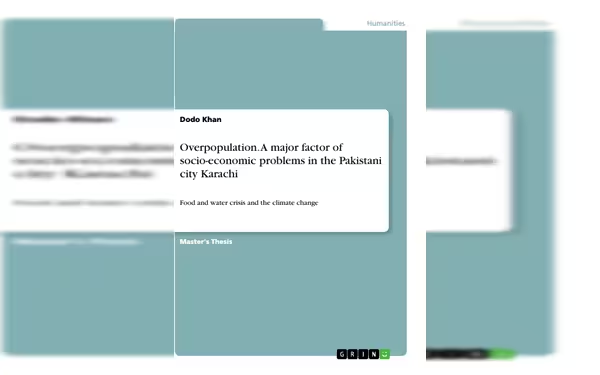Tuesday, July 2, 2024 04:49 PM
Pakistan's Overpopulation Crisis: Economic, Social, and Environmental Impacts
- Overpopulation strains economy, natural resources, and society in Pakistan
- High unemployment rates and underemployment due to surplus labor pool
- Healthcare and education systems overwhelmed by rapid population growth
 Image Credits: Diplomarbeiten24
Image Credits: Diplomarbeiten24Pakistan's overpopulation crisis poses severe economic, social, and environmental challenges, impacting sectors like healthcare, education, and food security. Sustainable strategies are crucial for long-term stability and growth.
Pakistan, as the fifth most populous country in the world, is facing a critical challenge of overpopulation, with a population exceeding 230 million. This demographic strain is significantly impacting the economy, natural resources, and various sectors of society.
The rapid population growth in Pakistan is leading to severe economic challenges. The increasing demands for food, energy, and water are stretching limited resources to their limits. The Pakistan Bureau of Statistics has warned about the depletion of water resources, projecting a water scarcity crisis by 2025. Energy demand surpasses supply, resulting in frequent power outages that disrupt daily life and industrial activities.
Joblessness and underemployment are exacerbated by overpopulation in Pakistan. The labor market struggles to absorb the influx of young individuals entering the workforce annually, leading to high unemployment rates and underemployment in informal sectors with inadequate pay. This surplus labor pool restricts economic mobility, depresses wages, and perpetuates social inequality and poverty.
Overpopulation is straining the healthcare and education systems in Pakistan. Overcrowded schools result in a decline in educational quality, with a high number of out-of-school children reported. The healthcare sector faces challenges with overcrowded and under-resourced public health institutions, leading to poor health outcomes and high mortality rates.
Rapid population growth has fueled unchecked urbanization, leading to housing shortages and environmental degradation. Major cities are expanding faster than infrastructure development, resulting in slums and informal settlements lacking basic amenities. Environmental degradation costs Pakistan about 9% of its GDP annually, impacting economic productivity.
Food security is a critical concern linked to overpopulation, with challenges such as water scarcity and land degradation hindering agricultural productivity. Without sustainable practices, Pakistan could face severe food shortages in the future.
Addressing the economic impacts of overpopulation in Pakistan requires comprehensive strategies. Family planning, educational programs, and investments in infrastructure, education, and healthcare are essential. Embracing sustainable development practices is vital for long-term economic stability. By implementing appropriate measures, Pakistan can harness its youthful population to drive economic growth and development, turning demographic challenges into opportunities.













